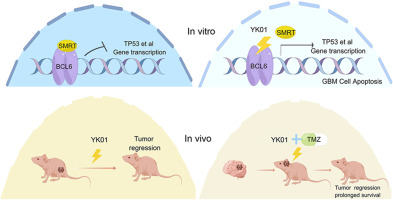
Selectively targeting BCL6 using a small-molecule inhibitor is a potential therapeutic strategy for glioblastoma


Glioblastoma multiforme (GBM) is the deadliest form of brain tumor, and effective treatments are lacking. Thus, a new generation of effective treatments is urgently needed. B-cell lymphoma 6 (BCL6) is a transcription factor that functions to suppress the transcription of DNA damage response genes, halting cell death in response to DNA damage. Here, we identified BCL6 as a lynchpin in GBM, the expression of which was greater in GBM cells than in normal cells and associated with poor survival in GBM patients. The silencing of BCL6 additionally affected GBM cell proliferation and triggered cellular damage. Furthermore, we reported the identification of YK01, a novel small-molecule inhibitor of BCL6. YK01 exhibited excellent anti-GBM bioactivity and caused apoptosis; importantly, YK01 significantly inhibited the growth of GBM cells both in vitro and in vivo. Moreover, the combination of YK01 and temozolomide treatment significantly suppressed the growth and metastasis of tumors in vivo and prolonged the survival of mice with tumors. In summary, our findings reveal that BCL6 appears to play a crucial role in GBM and may be a therapeutic target for treating this incurable condition.
